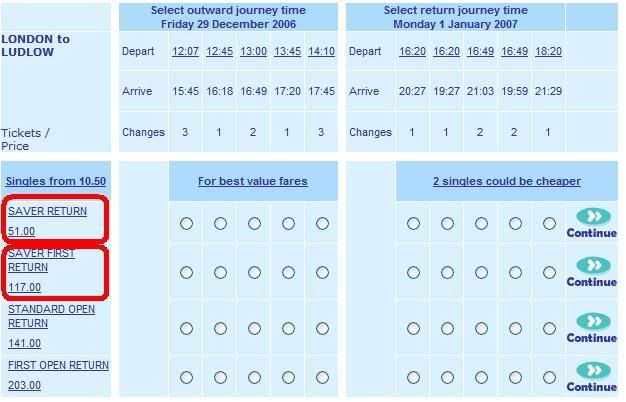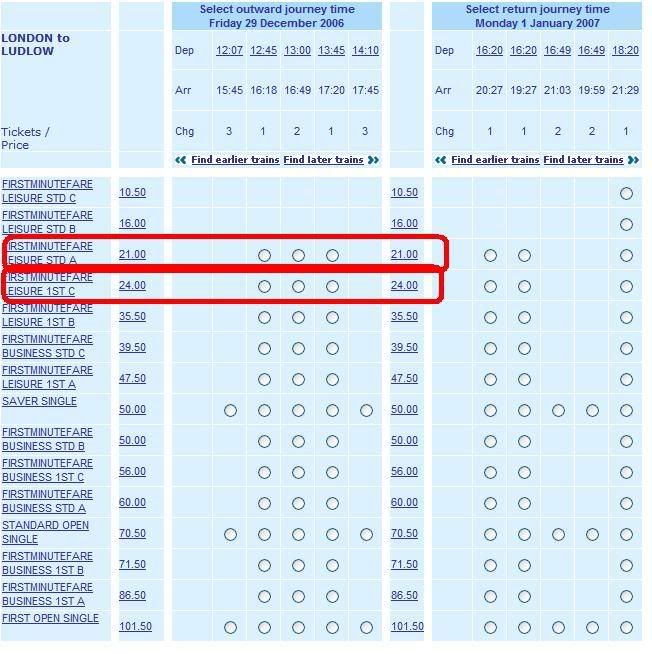Tim Harford finds it hard to talk about anything other than price discrimination and I'm beginning to understand why.
The basic idea is that, as a vendor, you want to maximise the amount of money you make. If you charge a lot for something, those able to afford to buy the item will pay for it but those who can't will not. If you lower your price to attract the more price sensitive shoppers, you inadvertently give a discount to people who would have willingly paid more.
What is one to do?!
Tesco and other retailers do it through such tricks as dressing up similar products in different ways (price sensitive customers get low prices by buying unattractively labelled "value" lines and less sensitive customers willingly hand over gobs of cash for similar products in nicer boxes with "finest" written on them).
Another of Harford's examples is Starbucks: they'll sell you a cheap "short" latte if you ask for it specifically (but they don't advertise it so that only the truly price sensitive - those willing to ask "do you have anything cheaper?" - benefit) and will willingly put syrrupy liquids in your cappuccino if you ask them to - for a high price.
I realised twice this weekend that www.thetrainline.com also does something similar (I'm probably late to this party...)
I will be spending New Year with some friends at a cottage we've hired in Ludlow. I tried to book my train tickets last night. The first price you see is the easy, no hassle one:

£51 for a standard class return
£117 for a first class return
But wait.....! Let's click on the "2 singles could be cheaper" link and see what happens...
If you're willing to sacrifice a little flexibility, look what happens:
That's right.... not only are two singles cheaper for standard class (£42 vs £51), it's also cheaper to go first class (£48).
So I'll be travelling to Ludlow in First Class for less than the less price-sensitive would pay for a standard class ticket.
Excellent.


12 comments:
But you are restricted in the trains you can travel on, right? This isn't the same product (ignoring the class of travel) at two different prices?
Selling the same product at two different prices to two parties has to be a marketer's dream, and is the very purest type of price discrimination, although that's pretty hard to achieve, I'll admit.
Hi Andrew.
Correct - the products are slightly different in two respects:
1) The low-price first-class product is only available for certain trains (which would, I guess, be like putting the "value" lines at the back of the store and perhaps hiding them behind the carrots or something)
2) The low-price first-class product is probably more restrictive than the more expensive one (in that you can't switch easily - even between trains offering the same price ticket)
Indeed, the products here are very different indeed in three regards:
1. As you say, the tickets are only valid for the service for which they are sold, are quota-controlled and have punitive change costs.
2. Crucially, the tickets are mass-market entities which are not regulated fares.
3. Less obviously, the tickets are valid only for the operator on which they are booked.
(1) is basically what you're reporting. Rather than comparing with value carrots, I'd relate to full-fare flights vice restrictive fares. Note certain less-obvious things follow: travel cannot be broken and you can't (unless the train manager agrees) catch an earlier train, even if your train is delayed.
(2) is the worrying development from the consumer's point of view. There are currently various fares which are regulated. That is annual price increases are pegged to inflation plus something, and they must always be available under certain circumstances - e.g., a saver ticket can be bought at the station for immediate travel and used on any train, except for certain stated peak trains.
The growth of buy-ahead tickets is likely to erode the market position of the saver. It would (will) be a sad time when you have to book ahead to use a train or else pay the punitive price of a full-fare open ticket.
(3) Is the biggest reason why operators are so keen on these tickets (beyond pricing leisure passengers onto less busy trains that would otherwise be carrying air): train fares are usually valid for any operator that serves a sensible route for the ticket. Such fares are distributed using a convoluted process known as ORCATS. So, for example, revenue from a ticket from London to Birmingham will mostly go to Virgin (Euston-New Street), with some going to Chiltern (Marylebone to Snow Hill). Whenever travel by the different operator might make sense, some money is distributed, even if very few people would actually use the alternative route. Note the curious case of Grand Central, who plan to run a tiny number of trains each day from Sunderland to London, non-stop from York, and thus abstract surprisingly high revenues from the incumbent operator GNER [BBC report] (before you start, note that I don't agree with GNER's claim against GC -- they each know the rules and GNER should have priced its franchise bid to compensate for this risk).
This is an important factor in the book-ahead case, because there, train-specific fares go entirely to the operator running the service. This also explains the rise of new high-end ticket types (the Finest range...) that long-distance operators have started to offer. These typically cost a similar amount to a traditional comparable ticket, have similar conditions, offer some incentive to the buyer and are always operator-specific. For example, GNER's GNER Executive Special Package which costs about the same as a FC open return (£300ish) and gives you free food and car parking for the minor inconvenience of traveling only by GNER.
IMO, the operators should start a range of budget walk-on fares, priced slightly less than a saver, that allow saver-like travel conditions but are limited to specific operator(s) (e.g. London to Birmingham, VWC only; London to St Helens, VWC+Northern only); Virgin has made some limited moves in this direction, but the cheaper options are not turn-up tickets. Ideally, ORR should regulate these, but that would probably take more political pain than ORR has shown itself willing to take.
-----
BTW, can I suggest a new design pattern? All online UK rail ticket purchases use the trainline booking engine and so offer identical products (i.e., the same subset of tickets which you could get buy going to a rail station). Under current rules, 11% (or some figure of that order) of the ticket price goes directly to the vendor. Thus, the additional £2 thetrainline charges you to use a credit card is stingy, to say the least. If you go to GNER you can still buy any UK ticket, but they don't levy a credit card charge.
Henry.... thank you for the information :-)
You make a good point about flexibility.... my return journey from Ludlow to London on New Year's Day allows five minutes to change at Newport. What do you suggest I do to deal with the risk that I'll miss my connection?
Good point about the "finest" package.... I'd noticed that Virgin offer something similar (I think it includes car parking or something like that).
As for the vendor taking a cut of sales and the carrier not necessarily capturing the rest of the ticket price due to ORCATS, thanks for explaining it. I knew there was some odd way of allocating ticket revenue but didn't realise the vendor took such a big cut.
Henry,
You raise some interesting points. I'm guessing you work in the rail industry? I think your usage of the title 'rail manager' is what gives it away - I'm still stuck on the older 'ticket inspector' :)
Richard: good point, something I forgot. Under the National conditions of carriage, if the rail industry messes up, it (your final operator, or the operator of the station where you are stranded) is always obliged to get you to your destination. So, if they have promised you a connection which you miss because your incoming is late, they will allow you onto the next service (or put you on a taxi if it's the last service of the day). Note, a connection will only ever be offered if it's within the minimum change time for a particular station.
May I suggest another design pattern? Provincial readers travelling to the continent via Eurostar, connecting in London, should always buy a connecting ticket to "London International CIV". This means that your whole journey is covered by CIV rules, so if your train from (say) Northampton to London and/or tube down to Waterloo is delayed and you miss your Eurostar, you will be put onto the next available service.
Note you can only buy a CIV ticket from a station and you must show your Eurostar ticket to get one. Also, they are rare beasties, so people sometimes report difficulties in persuading station staff to sell them.
Andrew: if only...
Thanks Henry.
Are the National Conditions of Carriage available anywhere?
Given the ticket back from Ludlow is so restricted, I want to have something I can refer to if the inspector on the FGW train refuses to let us board :-)
Andrew..... remind me to tell you all about Henry next time we catch up :-)
The technical limitations of liability are here; see section 43. Note that the stranded limitation is accepted to mean "stranded if your only valid train has departed". Note also that your connection is within the recommended bound specified by NR.
In practice, train operators always allow you to continue your journey, even if the cause of the disruption was "outside of their control".
Thanks Henry
It is an interesting exmaple of pricing in action. I'm looking forward to my flight on 22nd November with American.
I wanted to travel London/Tampa(via Chicago, Dallas, Miami) with American, then Tampa to Dallas and finally Austin.
IBM tells me they won't pay for this, even though the price is the same and it saves me 6+ hours travelling. I *HAVE* to fly London Dallas/Austin and the pay to fly myself to Tampa and back for thanksgiving.
So, taking the cheapest within policy flight on OTR, it takes me London/Miami/Dallas/Austin for 269 UK pounds.
Accoding to OTR the cheapest London-Miami flight the same day though is more than double the fare that I got... pricing in action
Thanks Mark.
I didn't even *attempt* to start a discussion on the bizarro world of airline pricing. What I find interesting in that arena is how some seemingly simple tricks can lead to such differentiation.
The one I like best is how a trivial factor (the role of saturday nights) can so effectively target business travellers for higher prices: prices that drop through the floor if you stay over on a Saturday is such a simple idea but so effective :-)
Post a Comment